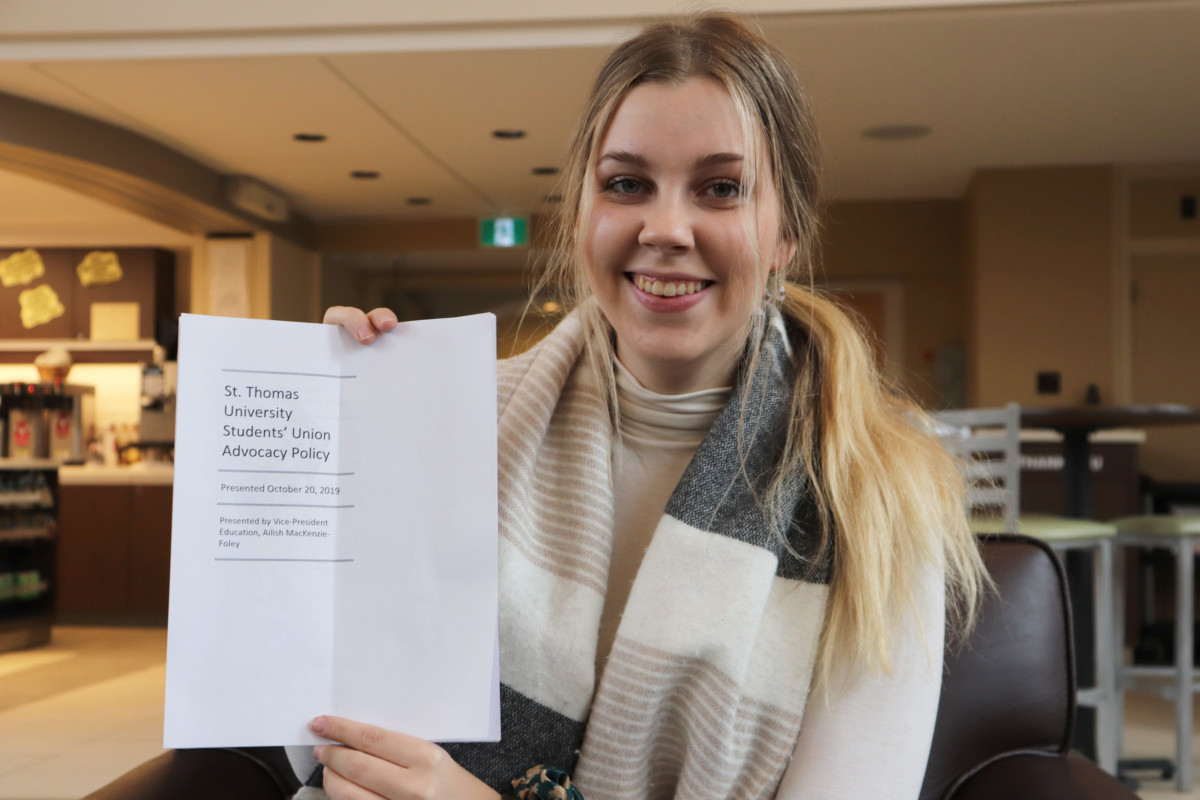St. Thomas University Students’ Union vice-president education Ailish Mackenzie-Foley presented this year’s advocacy policy document to the Student Representative Council on Oct. 21.
The document, which must be amended every year, outlines everything the STUSU believes in said Mackenzie-Foley, such as fighting for affordable education and the importance of experiential learning.
“Even though [the union] might not have to reference it every day, I think it’s still important to have our policies on all of these issues, to reference and to give to other people, so they can learn more about STUSU and what we stand for,” said Mackenzie-Foley.
Mackenzie-Foley said she added to the document but didn’t remove any policies from previous years.
Some of the policies already in the document included the support for a “predictable tuition” schedule at STU and the acknowledgement that student wellness is a combination of mental and physical health.
Mackenzie-Foley said one of her main focuses when updating the document was advocating for proper and accessible consultation with students before big financial changes are made within the university.
Under the funding and fees section, Mackenzie-Foley added the word “proper” in front of consultation of students, so it reads: “The Union supports the proper consultation of students prior to the implementation of new ancillary fees that add new services for students through an approval by the Union.”
“It’s small but powerful,” she said.
She said even if the university held hundreds of consultations on funding changes it doesn’t mean they were done properly.
“Just adding a small word like proper could mean making sure you consult with the right people, that you implement the things that you’re consulting them about, and just making sure the consultation is accessible to students.”
Mackenzie-Foley further supported this point by adding the words “accessible meeting” under the student consultation section, stating STUSU supports accessible meetings being held regarding major financial changes.
“I think accessibility is a key factor to that, because if there is a financial meeting happening in the middle of day during classes that’s not accessible.”
She said ideally these meetings would be held outside of class times so every student would have the option to attend.
“I want to make sure that it’s known that students want to go to these meetings, and they should be able to.”
The Student Union said they also support the re-implementation of debt-relief programs and upfront grants for students in need, another aspect Mackenzie-Foley said she’s now made clear in the document’s funding and fees section.
This addition comes after the New Brunswick government replaced the Free Tuition Program for the Renewed Tuition Access Bursary on April 9.
The new program was expanded to include private institutions. This meant while the pool of applicants expanded, the money available to individuals shrunk.
Previously, students could receive a maximum loan of $10,000 for university education and $5,000 for college education from the province. Now, the amounts have been reduced to $3,000 and $1,500 respectively.
The Timely Completion Benefit was also discontinued.
Accessibility aside, Mackenzie-Foley said the most important to her is the university’s policies section.
This year, Mackenzie-Foley added the harassment policy to the section university policies. This means the union supports the maintenance of the policy, and it will be monitored by the Academic and University Affairs committee. One of the committee’s jobs is to address issues of concern to members of the STUSU and all STU students.
The document will have to be amended again to include the specific priorities of the New Brunswick Student Alliance and of the Canadian Alliance of Student Associations.
“Keeping the university accountable while having a good working relationship with them is important. These [policies] affects so many students, these are personally important to me,” said Mackenzie-Foley.

